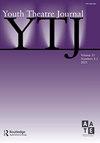Towards recognition and regard: Creating connectivity in theatre education through intentional wakefulness
Q1 Arts and Humanities
引用次数: 2
Abstract
ABSTRACT In secondary theatre education, activities described as spiritual, mindful and ritualized are normalized components of actor/crew training. Theatre techniques categorized by these concepts contribute to the development of the whole teen in addition to preparing them for rehearsal and performance. Yet these terms are rarely used for fear skeptics will scoff at theatre work for lack of rigor or accuse teachers of blending church and state. Little attention has been given to the positive effects that these experiences have on teens who live in fast-paced, technology-infused environments where instant gratification is a common-place expectation. Because adolescence is a period of particularly intense emotional, social, and spiritual growth, a heightened sense of self-awareness helps them become more sensitive to others as they gain a deeper sense of their own and others’ motivations, insecurities, and levels of self-confidence. Termed “Intentional Wakefulness” by the author, theatre strategies that guide student focus toward the development of their inner selves include breath, stillness, presence, and community students. This essay examines how these four aspects of theatre experience engage inner core development in high school theatre students and describes ways “Intentional Wakefulness“ manifests on a daily basis from the perspective on one practitioner.走向认可和尊重:通过有意唤醒在戏剧教育中创造联系
摘要在中等戏剧教育中,被描述为精神化、正念化和仪式化的活动是演员/剧组培训的正常组成部分。根据这些概念分类的戏剧技巧除了为排练和表演做准备外,还有助于整个青少年的发展。然而,这些术语很少被使用,因为怀疑论者会嘲笑戏剧工作不够严谨,或者指责教师将教会和国家融合在一起。人们很少关注这些经历对生活在快节奏、充满技术的环境中的青少年的积极影响,在这些环境中,即时满足是一种常见的期望。因为青春期是一个情绪、社会和精神成长特别激烈的时期,自我意识的增强有助于他们对他人更加敏感,因为他们对自己和他人的动机、不安全感和自信心有了更深的了解。作者称之为“有意觉醒”,引导学生专注于内心自我发展的戏剧策略包括呼吸、静止、在场和社区学生。本文考察了戏剧体验的这四个方面如何参与高中戏剧学生的核心发展,并从一位从业者的角度描述了“有意觉醒”在日常生活中的表现方式。
本文章由计算机程序翻译,如有差异,请以英文原文为准。
求助全文
约1分钟内获得全文
求助全文
来源期刊

Youth Theatre Journal
Arts and Humanities-Visual Arts and Performing Arts
CiteScore
0.60
自引率
0.00%
发文量
1
 求助内容:
求助内容: 应助结果提醒方式:
应助结果提醒方式:


